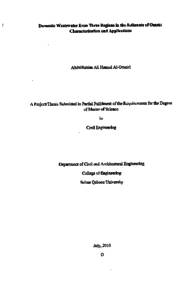Document
Development of consumer perception index for assessing greywater reuse potential in arid environments.
Identifier
DOI: 10.4314/wsa.v44i4.25
Source
Water SA. v. 44, 4, p. 771-781
Contributors
Haider, Husnain., Author
Al-Saleem, Saleem Saleh., Author
Ghumman, Abdul Razzaq., Author
Sadiq, Rehan., Author
Country
Pretoria.
Publisher
South African Water Research Commission.
Gregorian
2018-01-01
Language
English
English abstract
Arab countries are primarily situated in arid environments and face serious water scarcity challenges due to growing populations, urbanization, and climate change impacts. Reusing greywater, if adequately treated at the point of generation, poses less human health risk as compared to blackwater reuse. Consumers have several reasons for being unwilling to reuse greywater, including potential health risk, religious and cultural concerns, and feeling uncomfortable. There are several possible reuse applications of treated greywater, such as watering plants, floor cleaning, landscaping, toilet flushing, etc. Therefore, it is important to assess consumer perceptions about greywater reuse before its implementation in any region. In this research, a framework based on greywater reuse indicators (GWRI) was developed to assess consumer perceptions before and after introducing low-cost treatment (LCT). Later the framework was implemented for Muscat, Oman. A questionnaire survey was carried out with 110 households located in diverse socioeconomic settings to collect data about general demographics, existing water uses, water sources, greywater applications (after LCT), and in-house plumbing systems. Seven key GWRI were estimated and aggregated to develop an overall consumer perception index (CPI). The study results revealed that CPI improved significantly from ‘very low’ to ‘high’ after introducing LCT. However, governments should provide financial assistance to consumers for improving in-house plumbing systems, based on detailed investigations. The study revealed that the CPI can be applied across the globe and can save time and effort for municipal managers, engineers, and policy makers by providing information that will enable effective decision-making.
ISSN
0378-4738
Category
Journal articles

